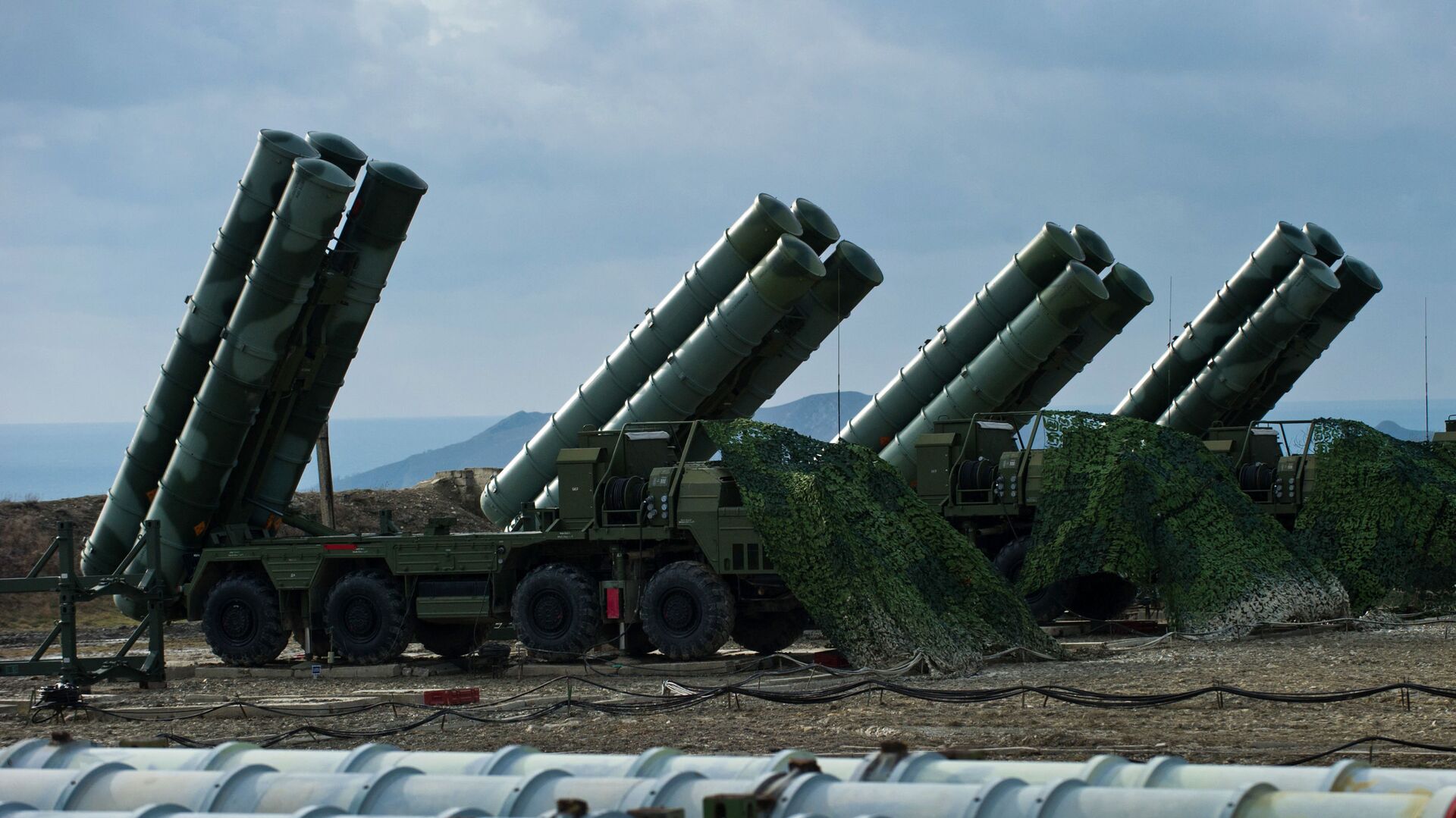https://sputnikglobe.com/20220415/india-reportedly-receives-s-400-shipment-from-russia-amid-ukraine-conflict-1094783241.html
India Reportedly Receives S-400 Shipment from Russia Amid Ukraine Conflict
India Reportedly Receives S-400 Shipment from Russia Amid Ukraine Conflict
Sputnik International
India signed a $5.43 billion deal with Russia in 2018 for the delivery of five S-400 systems by 2023. The first systems started to arrive last November. India... 15.04.2022, Sputnik International
2022-04-15T13:02+0000
2022-04-15T13:02+0000
2022-04-15T13:02+0000
us
russia
s-400
caatsa
ukraine
swift
sergey lavrov
lloyd austin
antony blinken
subrahmanyam jaishankar
https://cdn1.img.sputnikglobe.com/img/107923/88/1079238800_0:0:2966:1668_1920x0_80_0_0_96f4bfa36a1e7ecd7852d338f7d97032.jpg
India has received S-400 Triumf surface-to-air missile systems from Russia, with official sources in New Delhi saying to India Today that the country continues to “receive” its defence supplies from Moscow in spite of US-led efforts to disrupt security ties between the two countries.Officials have said that the S-400 missile system is “now operational” and has been deployed at “designated locations”.The report also stated that New Delhi has been stockpiling spares of Russian-made equipment since the conflict in Ukraine began on 24 February. Officials also expressed concerns that the defence supplies from Russia to India could be affected in future due to exclusion of pertinent Russian financial institutions from SWIFT system.Excluding Russian banks from SWIFT is among economic measures adopted by the western allies, including the US, EU and others, to respond to the Moscow’s “special military operation” in Ukraine.However, these unilateral sanctions have been rejected by New Delhi, with Indian officials saying that they have been working out ways to “stabilise” commercial ties and find a way around the western sanctions.The latest delivery of Russian S-400 systems to India also comes against the backdrop of recent leadership level contacts between India and the US as Washington continues its attempts to draw New Delhi away from Russian military hardware.During a meeting between Indian Defence Minister Rajnath Singh and US Defence Secretary Lloyd Austin in Washington this week, the American side said that it was committed to make military equipment available to Delhi at an “affordable price”.Moreover, the US has so far refused to concede a waiver to India under the Countering American Adversaries Through Sanctions Act (CAATSA), a domestic American legislation that penalises defence purchases from Moscow.Around 60 percent of India’s military needs are sourced from Russia, with the two nations historically enjoying a close, friendly security relationship.During a visit to New Delhi this month, Russian Foreign Minister Sergey Lavrov stated that US “pressure” won’t affect bilateral relations between Russia and India. The top Russian diplomat also said that Moscow was “ready to discuss” anything that Delhi might need from Russia.
https://sputnikglobe.com/20211122/indias-induction-of-s-400-systems-tilts-balance-of-power-against-pakistan-says-army-veteran-1090922538.html
ukraine
Sputnik International
feedback@sputniknews.com
+74956456601
MIA „Rossiya Segodnya“
2022
News
en_EN
Sputnik International
feedback@sputniknews.com
+74956456601
MIA „Rossiya Segodnya“
Sputnik International
feedback@sputniknews.com
+74956456601
MIA „Rossiya Segodnya“
us, s-400, caatsa, ukraine, swift, sergey lavrov, lloyd austin, antony blinken, subrahmanyam jaishankar
us, s-400, caatsa, ukraine, swift, sergey lavrov, lloyd austin, antony blinken, subrahmanyam jaishankar
India Reportedly Receives S-400 Shipment from Russia Amid Ukraine Conflict
India signed a $5.43 billion deal with Russia in 2018 for the delivery of five S-400 systems by 2023. The first systems started to arrive last November. India has ignored the threat of American sanctions over the deal, amid several warnings by successive US administrations.
India has received S-400 Triumf surface-to-air missile systems from Russia, with official sources in New Delhi saying to India Today that the country continues to “receive” its defence supplies from Moscow in spite of US-led efforts to disrupt security ties between the two countries.
Top Indian sources told India Today there haven’t been any “delays or issues” in receiving crucial spares from Moscow. The latest order comprises “overhauled engines” which were delivered to India through the sea route, as per officials, with some parts of the advanced Russian missile system also arriving by air.
Officials have said that the S-400 missile system is “now operational” and has been deployed at “designated locations”.

22 November 2021, 12:37 GMT
The report also stated that New Delhi has been stockpiling spares of Russian-made equipment since the conflict in Ukraine began on 24 February.
Officials also expressed concerns that the defence supplies from Russia to India could be affected in future due to exclusion of pertinent Russian financial institutions from SWIFT system.
Excluding Russian banks from SWIFT is among economic measures adopted by the western allies, including the US, EU and others, to respond to the Moscow’s “special military operation” in Ukraine.
However, these unilateral sanctions have been rejected by New Delhi, with Indian officials saying that they have been working out ways to “stabilise” commercial ties and find a way around the western sanctions.
The latest delivery of Russian S-400 systems to India also comes against the backdrop of recent
leadership level contacts between India and the US as Washington continues its attempts to draw New Delhi away from Russian military hardware.
During a meeting between Indian Defence Minister Rajnath Singh and US Defence Secretary Lloyd Austin in Washington this week, the American side said that it was committed to make military equipment available to Delhi at an “affordable price”.
Moreover, the US has so far refused to concede a waiver to India under the Countering American Adversaries Through Sanctions Act (CAATSA), a domestic American legislation that penalises defence purchases from Moscow.
“We continue to urge all countries to avoid major new transactions for Russian weapons systems, particularly in light of what Russia is doing to Ukraine. We've not yet made a determination on potential sanctions or potential waivers under the CATSAA law," Blinken said during a press conference in Washington, after holding the 2+2 Dialogue with Singh, Austin and Indian Foreign Minister S. Jaishankar.
Around 60 percent of India’s military needs are sourced from Russia, with the two nations historically enjoying a close, friendly security relationship.
During a visit to New Delhi this month, Russian Foreign Minister
Sergey Lavrov stated that US “pressure” won’t affect bilateral relations between Russia and India.
The top Russian diplomat also said that Moscow was “ready to discuss” anything that Delhi might need from Russia.



